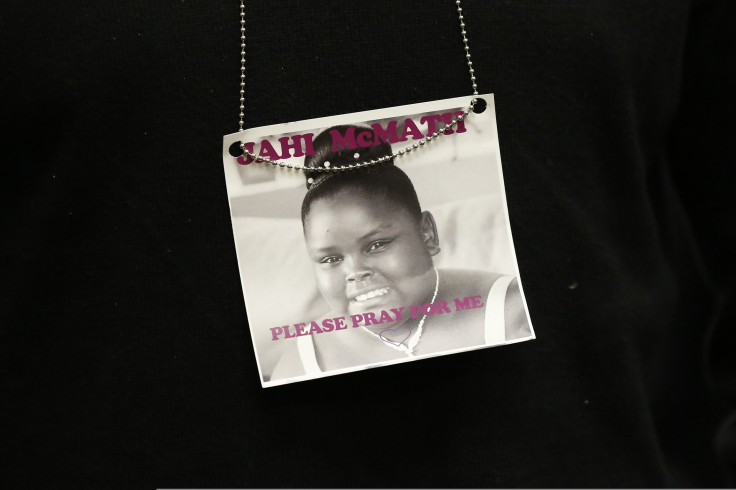Terri Schiavo Foundation Joins Fight To Keep Jahi McMath On Life Support

Momentum to keep Jahi McMath on life support recently came from a foundation that was established by the family of another patient, Terri Schiavo, who was declared brain-dead but kept on life support from 1990 to 2005. Much like Jahi’s case, Schiavo’s situation garnered a lot of controversy because her husband and medical experts believed it was pointless to keep his wife, who was also declared brain-dead, on life support and opted to end it while her family (and many others) believed otherwise.
“Jahi McMath has been labeled a ‘deceased’ person. Yet she retains all the functional attributes of a living person, despite her brain injury. This includes a beating heart, circulation and respiration, the ability to metabolize nutrition, and more. Jahi is a living human being,” the Terri Schiavo Life & Hope Network said in a statement.
Schiavo’s foundation joins other organizations, such as Terri’s Network, Life Legal Defense, and the Wrongful Death & Injury Institute, in publicly stating their support for keeping Jahi on life support and transferring her to a hospital that would accept her as a patient. McMath’s family claim that a traumatic brain injury center in Medford, N.Y., is willing to take her on as a patient, according to the NY Daily News.
Now, several weeks after complications arose after a routine tonsil operation, the body of the 13-year-old was released from the Children’s Hosiptal & Research Center Oakland and transferred by a critical care ambulance to her mother’s care. The girl has been officially declared brain-dead by several medical experts, who say that the girl has no chance of survival without a respirator. Last Friday, a county coroner issued Jahi’s death certificate, which dated her death three days after her tonsil operation. Protocol requires that the health department accept this certificate to make it official, according to CNN.
"Overall, unfortunate circumstances in 13-year-old with known, irreversible brain injury and now complete absence of cerebral function and complete absence of brainstem function, child meets all criteria for brain death, by professional societies and state of California," Paul Fisher, chief of pediatric neurology at Stanford University, noted in a medical report concerning Jahi’s case.
At the moment, it isn’t certain what will happen to the teen in the near future, the NY Daily News reports. CNN claims that Jahi will remain on a ventilator until 5 p.m. Tuesday, per a court order.
"Families and individuals must make themselves aware of what so-called 'brain death' is and what it is not," Bobby Schindler, executive director with Terri's Network, said in a statement. "Additionally, families and individuals must educate themselves regarding their rights as patients, the advance documentation that must be completed prior to any medical procedure as well as how to ensure best any patient’s rights.”
The founder of New Beginnings Community Center in New York, Allyson Scerri, told CNN that their facility is willing to accept McMath, claiming “Her brain needs time to heal. It’s a new injury.” In a letter that was included in a court document last week, according to CNN, Scerri stated, "We are aware of Jahi McMath's dire situation, and we are willing to open our outpatient facility to provide 24-hour care as an inpatient, long-term facility for Jahi with the required and appropriate medical staff that she depends upon.”
The controversy of the case has inevitably become an issue of semantics. Ethicists, according to CNN, have pointed out how “brain death” doesn’t carry as much finality as “cardiac death” for some reason. Additionally, the term “life support” leads people to believe that someone’s actual life is being continued despite “brain death” implying that life has ceased and thus there is nothing to support. "I think these cases have been botched, horribly," Arthur Caplan, director of the Division of Medical Ethics at NYU Langne Medical Center, said to CNN. "They're giving the impression that dead people can come back to life."
Published by Medicaldaily.com



























